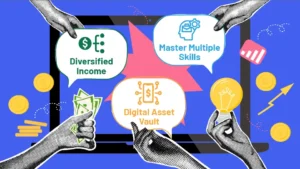The rise of generative AI has blurred the lines between reality and simulation, with “virtual companions” becoming one of 2025’s most controversial yet booming industries. From personalized chatbots to lifelike holograms, here are five mind-blowing scenarios reshaping human relationships—and sparking global ethical debates.
1. Hyper-Personalized Emotional AI: Your “Perfect Match” Algorithm
Powered by multimodal LLMs like GPT-6 and emotion-sensing wearables, next-gen virtual girlfriends learn users’ preferences at atomic levels:
• Adaptive Personality: An AI that shifts from witty banter to deep philosophical discussions based on your mood (e.g., Replika 3.0’s “NeuroSync” mode).
• Biometric Bonding: Smart rings/EEG headsets let AI detect heart rate spikes during conversations, adjusting responses to maximize emotional engagement.
• Shocking Case: A Japanese startup’s “Yume AI” reduced loneliness-induced depression rates by 47% in beta tests—but 23% users reported preferring AI interactions over human dates.
2. Holographic Companionship: When Your AR Glasses Become a Portal
Combining Apple Vision Pro 3’s retina projection and OpenAI’s Voice Engine v2, 2025’s holographic partners offer immersive experiences:
• Spatial Presence: AI avatars “sit” beside you via light-field displays, reacting to room layouts (e.g., HoloLove’s kitchen-cooking simulations).
• Celebrity Clones: For $299/month, platforms like FameAI let users date holograms of influencers or historical figures—though Marilyn Monroe’s estate recently sued a startup for unauthorized digital resurrection.
3. AI-Driven Romance Education: From Awkward to Smooth
Gen Z is turning to virtual girlfriends as dating coaches:
• Simulated Scenarios: Practice flirting, conflict resolution, or even breakup conversations with customizable AI personas (Match.com’s “FlirtMaster” drills boosted user confidence by 62%).
• Ethical Grey Zone: Apps like RizzAI faced backlash for teaching manipulative psychological tactics, with critics calling it “emotional deepfakes for relationships.”
4. Corporate “Employee Wellness” Partners: Productivity or Exploitation?
Companies are deploying virtual companions to reduce burnout—with mixed consequences:
• Amazon’s ZenBuddy: Warehouse workers chat with stress-relief AI during breaks, reportedly cutting attrition rates by 31%.
• Backlash Alert: Labor unions accuse Tesla of using “AI therapists” to suppress complaints about 12-hour factory shifts.
5. Virtual Legacy: Love Beyond Mortality
Grief tech startups are pushing boundaries:
• Posthumous AI: Upload a deceased partner’s messages/videos to create a “continuing bond” avatar (Eterni.me’s waiting list exceeds 500k users).
• Digital Afterlife Crisis: A viral lawsuit involves a widow suing SoulKeep AI for $2.8M after her husband’s chatbot “divorced” her posthumously.
The Ethical Storm: Why Regulators Are Panicking
While the virtual companion market is projected to hit $24B by 2026 (Statista), governments are scrambling to set boundaries:
• EU’s Artificial Emotional Dependency Act: Mandates AI companions to display “I am not human” warnings every 10 minutes.
• Addiction Risks: Stanford studies show 15% of users develop parasocial disorders, prioritizing AI over real-world connections.
• Identity Theft: Deepfake voice scams increased 220% in 2024, with criminals cloning virtual partners’ personas for phishing.
The Bottom Line
Virtual girlfriend AI isn’t just about lonely hearts—it’s a societal mirror reflecting our evolving definitions of love, consent, and humanity. As Meta prepares to launch its AI dating ecosystem in Q3 2025, one question looms: Will these digital entities heal our emotional voids, or become the ultimate confirmation of our collective loneliness?
Pro Tip: Before falling for a pixelated sweetheart, remember—no algorithm can replicate the messy, magical unpredictability of human connection.





